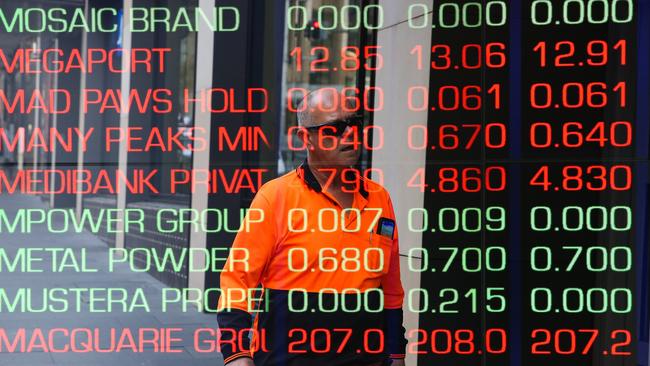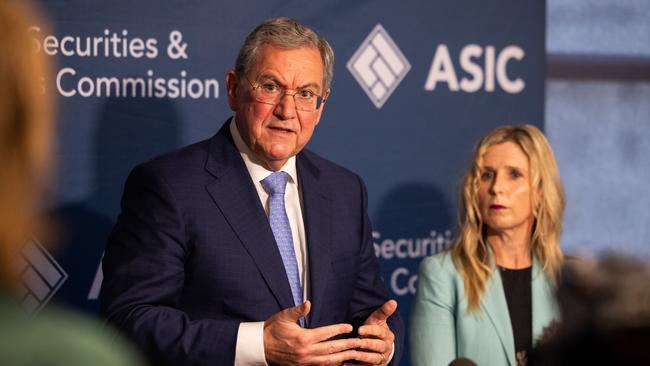ASIC addresses the low number of companies being listed on the Australian sharemarket
ASIC will begin a two-year trial it hopes will turn around the notable decline in the number of companies being floated on the Australian sharemarket.

Business
Don't miss out on the headlines from Business. Followed categories will be added to My News.
The market regulator is aiming to boost the number of companies floating on Australia’s sharemarket with a two-year trial that makes it faster to take a business public.
The Australian Securities and Investments Commission from Tuesday will cut the turnaround time for initial public offerings by opening up an informal review channel through which documents could be shown to the regulator up to two weeks before they are publicly filed.
Companies utilising this access would gain at least a week on their IPO timeline.
More importantly, the changes would allow an issuer to have its documentation vetted in a bid to reduce the need for supplementary or replacement prospectuses.
This additional documentation is required when ASIC determines investors have incomplete or wrong information.
ASIC chair Joe Longo said the regulator had developed the slimmed-down approach to IPOs after sounding out investors and market participants in February about the shrinking public market.
Homegrown data centre operator AirTrunk elected to sell itself to Blackstone in a $24bn enterprise value deal last year, underscoring the riches on offer from private markets.
Global bourses are facing a decline in floats as more companies favour staying private or striking a deal with private capital providers like venture capital firms, private equity managers or trade sales.

It’s not all bad news: Chemist Warehouse chose listed life through its merger with Sigma Healthcare, creating a $36bn ASX company. Washington H Soul Pattinson will become a top-50 ASX company by dissolving its cross-shareholding with Brickworks in a deal structured this month.
Bain Capital will float Virgin Australia on June 24.
Mr Longo said the revamp would mean “more investment opportunities so companies can expand, increase jobs and ultimately economic growth”.
Historically, the sharemarket is a desirable place to be because it offers access to capital. Increasingly, that capital is available from sophisticated investors elsewhere, without the same regulatory and compliance obligations required of a listed company.
“Our initial public offerings are the lowest they have been in over a decade, and companies are delisting,” Mr Longo said.
“Meanwhile, our secondary capital raising settings continue to be globally recognised for their speed and efficiency.”
Sharemarket listings have dropped from 2073 in 2014, to 1989 in 2024.
ASIC also hopes its procedural change would reduce the risk that market volatility and consequential offer pricing changes topple a float. Investors can spook easily if conditions appear adverse.
By offering greater deal certainty, more companies would hopefully choose to list, Mr Longo said.
In its submission to ASIC’s review of public and private markets, the ASX said the regulator should allow companies to issue different share classes, which would allow founders or particular groups to retain control.
Australia’s software giant Atlassian, for example, is listed in the US.
The market operator also called for lessening the amount of free-float required for companies from its current 20 per cent limit to Wall Street’s 10 per cent.
The regulator is also introducing a “no-action” position for companies seeking to list when they make an application during their exposure period.
Mr Longo said while regulator settings were not “the silver bullet”, ASIC was still “considering further regulatory adjustments to support a strong and well-functioning market”.
ASIC’s trial is available for companies with a market capitalisation of $100m or more, and no ASX-imposed escrow.
Companies must contact ASIC at least 14 days before their formal lodgement date.
The regulator will monitor the effectiveness of its no-action position, and said it reserved the right to modify or withdraw it “at any time”.
Since the pandemic, the ASX suffered a structural decline in IPOs and capital raised in dollar terms, but this is also true for Canada, Germany and the UK, ASIC said in its flagship discussion paper released in February.
Not only are IPOs drying up but historic names like Sydney Airport, AusNet Services, and Crown have disappeared through takeovers, shrinking the ASX’s legacy issuers.
“The literature indicates that the regulatory burden is only a small contributor to the decline,” ASIC’s report surmised.
More Coverage
Originally published as ASIC addresses the low number of companies being listed on the Australian sharemarket





